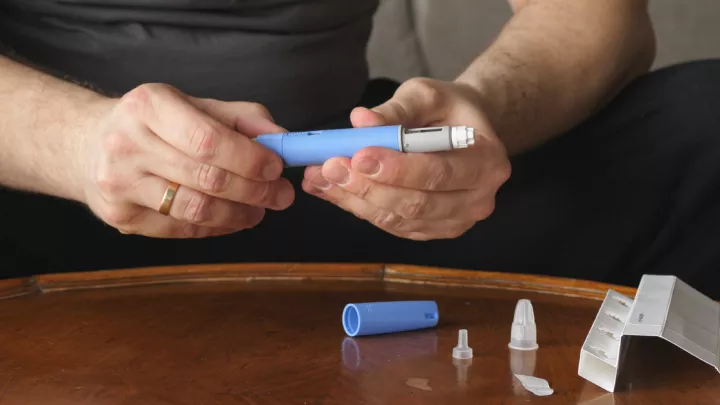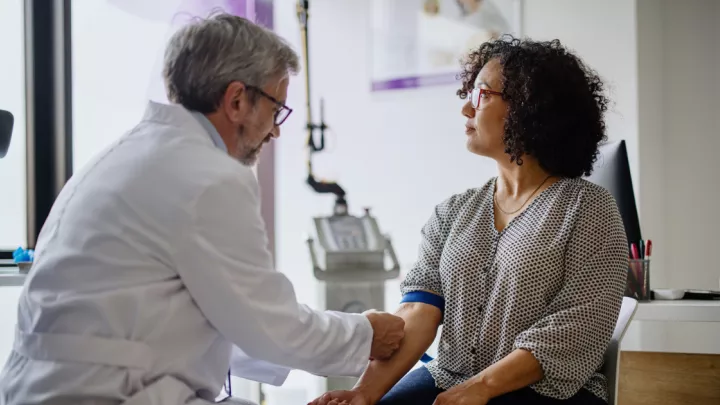4 benefits of in-clinic orthopaedic procedures

Planning a surgery can be costly and time-consuming. The idea of going to an operating room or a hospital can be scary for some. About three years ago, Joseph Morgan, MD, Nebraska Medicine orthopaedic surgeon, proposed that Nebraska Medicine should consider moving some minor hand procedures from an OR setting to a clinic setting.
“This all started during the COVID-19 pandemic in 2020 – we weren’t able to do as many surgeries in the OR from an elective standpoint,” says Dr. Morgan. “We were hoping to improve access and make it easier for patients who didn’t need to go to the OR and deal with those restrictions. It’s beyond that now, as we’ve loosened COVID-19 restrictions.”
“I’m excited to bring this opportunity to our patients,” says Beau Konisberg, MD, Nebraska Medicine orthopaedic surgeon. “The added convenience of procedures done in our clinic treatment room over an operating room is a tremendous time saver and significantly less expensive.”
Dr. Morgan specializes in upper extremity care, from elbows to fingertips. He treats nerve injuries and compressive neuropathies, microvascular surgery, degenerative conditions and traumatic injuries to the hand and wrist. Some of the procedures he and his team, including Denise Sydnor, CMA, and Erin Walsh, PA, will be treating in the clinic are:
- Carpal tunnel release
- Trigger finger release
- Percutaneous needle aponeurotomy for Dupuytren’s contracture
- Mucuous cyst or ganglion excision in finger
- De Quervain’s release
- Mallet finger repair
- I and D finger joints
- Partial finger amputation
There are many benefits for patients to have these procedures performed in the clinic rather than traditional outpatient surgery in an OR setting. These include the following:
1. Cost
In a clinic setting, there are no hospital room charges or related costs. Carpal tunnel release, for instance, is about 30% less expensive in a clinical setting than in an OR. The surgeries performed are identical with the same quality of care.
“It’s been shown in research to be much more affordable for patients because we’re eliminating the cost of the operating room and the overhead that goes into it – extremely cheaper,” says Dr. Morgan. “In a clinic, patients are only paying for the surgeon fee and expense of the equipment.”
2. Time
“We’re going to be able to offer many minor procedures that, until now, have only been available in the operating room in the clinic space. That allows easier access for people, more versatility and less time constraints,” says Dr. Morgan.
Surgeries and procedures can take longer than expected, and surgeries can be delayed in the OR setting. There will now be more control over scheduling in-clinic procedures with little to no delay or rescheduling challenges due to unforeseen factors like OR availability.
3. Stress
A hospital setting can be upsetting or stressful for some patients, especially children. In-clinic procedures are less stressful and allows the patient to recover in their home instead of a hospital room.
4. Convenience and accessibility
Access to and from a clinic is easier and more convenient than a hospital. Procedures performed in the clinic are often less invasive.
“Our more common procedures are done in just a few minutes and only require a small incision and about two stitches to close,” says Dr. Morgan. “We use local anesthesia, and there’s no downtime, therapy, or rehabilitation for relatively minor operations. Patients can even drive themselves to and from the clinic.”
Patients can schedule in-clinic procedures with Dr. Morgan any day of the week, whenever they choose.
“It’s going to be a very patient-friendly experience. You don’t have to schedule through the OR – just work it out with me and my team. There are no hoops to jump through. It’ll be very easy and a huge cost-saver,” says Dr. Morgan.
Dr. Morgan and his team, including orthopaedic clinic manager Samantha Ricks, plan to begin scheduling clinic procedures in November.







